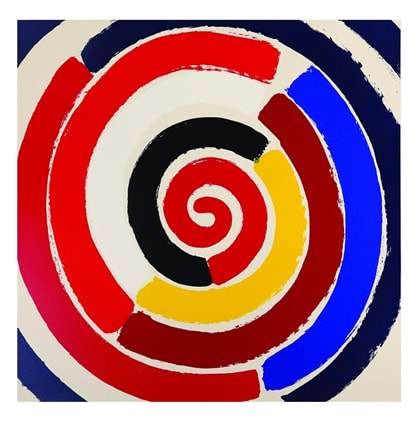We are delighted to showcase the work of two St Ives artists who led the post-war abstract art movement in the UK. Terry Frost and Sandra Blow’s work will be on display at CCA Galleries International from 10th March to 11th April 2015.

Image: 'Red Melange' by Sandra Blow
S
andra Blow RA (1925 -2006) was one of the leading lights of the abstract art movement of the 1950s. Her works are often on a large scale and consist of abstract collages made up from cheap discarded materials such as sawdust, cut-out strips of old canvas, plaster and torn paper.
The use of such materials is designed to create an expressive informality and promote a natural, organic feeling. Her works have a tactile as well as visual emphasis on surface, and her use of simple large geometric shapes lends a feeling of expansiveness and dynamism. In the later part of her life, she lived in St Ives, reinvigorating a Cornish art scene bereft of the glories she had sampled there as a young artist. She exhibited locally and also fulfilled her role as a Royal Academician, participating in every Summer Exhibition at Burlington House, where she enjoyed a retrospective in 1994 at the Sackler Galleries.
Sir Terry Frost RA (1915-2003) was a giant of British Abstract Art. Frost served during the war in countries as diverse as Palestine and Greece, before being captured in 1941. He remained a prisoner until the end of the war, an experience that changed his outlook on life and introduced him to the possibilities of art. According to Frost, ‘In prisoner-of-war camp I got tremendous spiritual experience, a more aware or heightened perception during starvation, and I honestly do not think that awakening has ever left me.’ On his return to Britain Frost moved to St Ives and lived for the rest of his life amongst the burgeoning artistic community. His work reflects the inspiration he found in the Cornish light, glittering seas and watery reflections. He was awarded the John Moore’s Prize in 1965, elected to the Royal Academy in 1992 and knighted in 1998.

Image: 'Spring Spiral' by Sir Terry Frost
‘From St Ives to St Helier’ will include rarely-seen original paintings and collages by both Frost and Blow released from the CCA Galleries archive for this exhibition. Many of Blow’s paintings were made on a commanding scale, often several metres square (and therefore rarely displayed). Their sheer scale means they give a greater insight into her experimental processes, pieces such as ‘Interconnections’ (2006) show how she transferred techniques from smaller works and print editions into huge canvasses, as well as demonstrating her confidence and mastery of form and colour. Frost’s original collages reveal a different aspect of his sensibility to his prints, making it fascinating to see them together. The original works continue to embody his joie de vivre and fascination with light and form, but seem more sensitive and delicate than his printed works, and are often made on a more intimate scale, as can be seen in ‘Necklace’ (1996).
The original prints and works on paper and canvas by both artists communicate the freedom and inspiration they felt in a small harbour town by the glittering sea- a location with more than a few parallels to St Helier.
Managing Director of CCA Galleries International, Gillian Duke who has curated the exhibition says; “We worked with Sandra for over seven years before her death and in that time published many stunning silkscreen prints with collaged elements, textures and glazes. Her uncompromising approach pushed printmaking techniques to new boundaries with the introduction of hessian, film and cloth; the prints are almost sculptural.”
“We were also privileged to work with Terry making prints at Coriander Studio for many years and publishing his work right up until the last years of his career. CCA’S close relationship with both artists means that we have some wonderful original pieces by them in our archive, which we are delighted to exhibit. This show will highlight how their work complements each other as they both drew inspiration from colour, light and the pleasure of existence.”